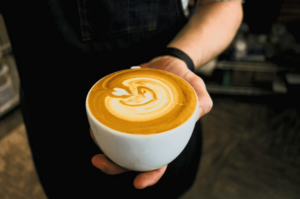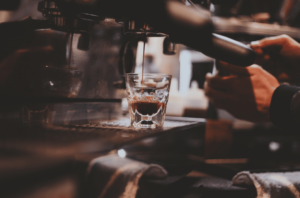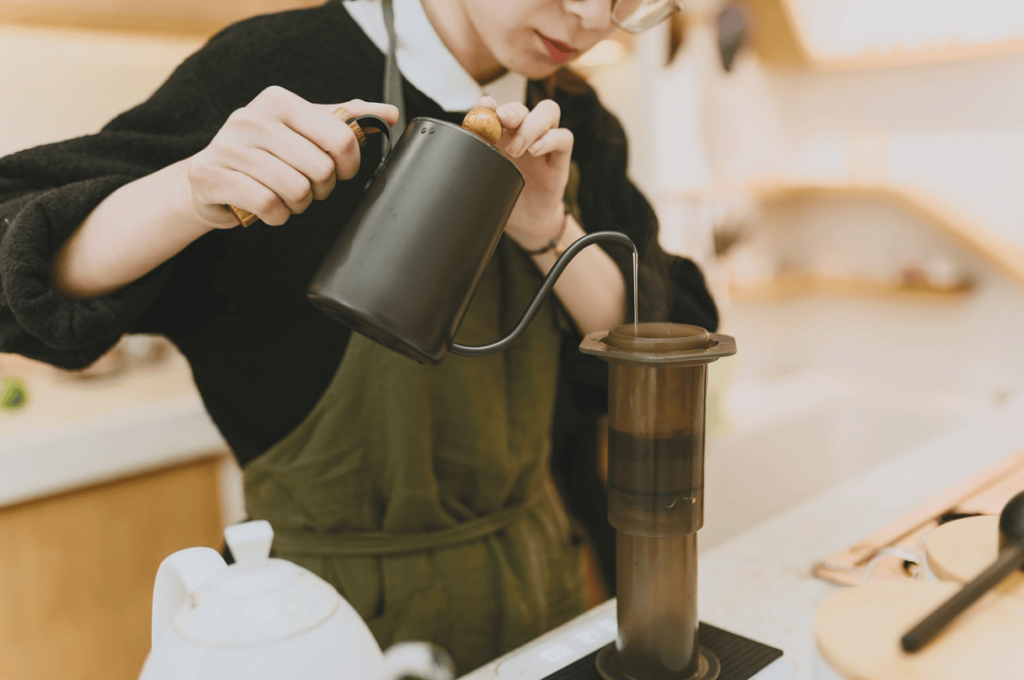Nothing beats the smell of fresh coffee in the morning, right? If you're already drooling, maybe being a barista is your thing. Just think about it: surrounded by the amazing smell of coffee beans, showing off your creativity, and getting paid for it.
But hold up, being a barista isn't all fun and games. It's hard work! You need to be friendly, have a steady hand, and be patient to do well and make a career out of it. Let's chat about what it takes to be a barista, how much you can make, and where to find a job.
So, how do you get started? Well, it's all about loving coffee, practicing your skills, and not giving up. We'll walk you through it, from learning the basics to landing that dream job. And hey, we'll even spill the beans on how much cash you can expect to pocket. So, grab a cup, and let's talk barista life!
In this article we'll cover:
- What Is a Barista?
- What Does a Barista Do?
- How to Become a Barista
- What Skills help a Barista?
- What Is a Barista Training Program?
- How Much Do Baristas Make?
- How to Find Barista Jobs
- Frequently Ask Questions
If you're interested in learning more about baristas, just click on the additional articles below to explore further!
What is a Barista?

Being a barista is like being a coffee magician! You mix art and science to make fancy drinks at a café or coffee shop. Think different types of coffee, flavors, and milks all in one cup. And it's not just about taste – it's about making it look awesome too! Ever seen those cool designs on lattes? That's part of the fun. Learning to pour milk just right to make pictures like swans or sunsets. It's pretty neat!
What Does a Barista Do?
Your main task as a barista is to make coffee and espresso drinks like lattes, macchiatos, and cappuccinos. Being nice to customers is also really important. You'll talk to everyone, take their orders, suggest drinks, and serve them with a smile. If you work at a small café, you might also help clean up and make sure everything is stocked. That's what being a barista is all about!
Baristas begin their day bright and early. Did you know that Americans drink 400 million cups of coffee a day.
A good barista should have:
- Great listening and talking skills.
- A focus on customer service.
- Being organized.
- Handling fast-paced work situations.
How to Become a Barista

You can start learning to be a barista as early as high school! Working part-time at a coffee shop is a great way to begin. You'll get the hang of things by doing tasks like sweeping and taking orders.
If you're interested, the barista might show you how to use the machines and whip up basic coffee drinks, especially when it's not too busy. You might even get to try your hand at creating fun designs on lattes!
While you're there, take a look at the menu and sample different drinks during your breaks. Just make sure to ask if there are any perks for employees before ordering.
To impress your boss, dive into coffee knowledge – learn about where the beans come from, how they're roasted, and why fair trade is important. But remember, being a barista isn't easy, and you can't practice at home unless you have the right equipment.
If you're aiming high for a successful barista career, consider getting some extra training.
What Skills help a Barista?
Before you decide if being a barista is your cup of tea, it's good to know what skills you need to rock the role.
Here are some:
- Customer service: Being friendly and chatting with regulars and newbies to keep them coming back.
- Math: Quickly figuring out prices for drinks and big orders to keep the line moving.
- Teamwork: Working well with other baristas and servers to give customers great service.
- Creativity: Making drinks look awesome and trying out new recipes.
- Physical stamina: Being strong enough to stand on your feet all day.
- Cheerful attitude: Being upbeat and welcoming to make customers feel happy.
- Leadership: Taking charge and sorting out any problems.
- Negotiation: Handling suppliers.
- Good taste buds: Picking and making top-notch coffee.
These are just some of the skills you'll need, but you can always learn and improve while on the job!
What Is a Barista Training Program?
Learning to be a barista is easy-peasy with all the options out there! Big coffee chains have their own training, and coffee groups offer classes too. Plus, there are private coffee schools that teach online or in person.
You've got choices! Some classes are just for a day and focus on making espresso. Others cover everything from making drinks to fixing equipment. And if you dream of having your own café, there are classes for that too.
Take note: The cost varies. Online courses can be around $20 for a few hours of learning. Or you could spend $1,400 for a two-day, in-person course.
Barista classes include:
- Drink Construction and Taste Differences
- Milk and Latte Art
- Grind, Dose, Tamp, Extract
- Coffee Farming
- Milk Science
- Roasting and Brewing
- Green Coffee
- Sensory Skills
- Cupping Essentials
- Latte Art
- Technical Machine Maintenance
- Coffee storage and freshness
- History of Espresso
- Different Types of Espresso Machines and Grinders
- Steam and Milk
- Efficient Workflow Practices
- Best Practices for Customer Service, Health, and Safety
Barista Certification
There are plenty of certification programs out there for baristas, giving you options galore. How much training and testing you want is up to you. But do certifications mean more cash for baristas? Not always, but they do give you a leg up when job hunting.
Some of the top certification programs include:
- SCA (Specialty Coffee Association) Diploma
- SCAA Level One Certification
- Barista Guild Certification
- American Barista and Coffee Certification
- Barista Hustle Certification
With these certifications under your belt, you're all set to brew up success in the coffee world!
How Much Do Baristas Make?

Most baristas make around $15.20 an hour, but it can vary from $11.19 to $20.66 hourly. And don't forget about tips – they can add up to about $20 a day on average! Just make sure to ask about the tip policy before you start. Some places share tips among all staff working at the time, while others add them to your paycheck separately.
How to Find Barista Jobs
When putting together your barista resume, don't just focus on your work history. You can highlight all the skills, courses, and certifications you've picked up along the way. And don't forget about your cover letter – it's a chance to share your love for coffee and your dreams of being a top-notch barista.
Once you've got your resume and cover letter ready, it's time to start searching for barista jobs! Some places in the U.S. really need baristas.
These areas include:
Final Thoughts
Becoming a barista is an exciting journey! Start by working part-time in coffee shops to get experience. Take training courses to learn new skills. Be friendly, eager to learn, and always try your best. Practice making different coffee drinks.
Connect with other baristas. And most importantly, keep loving coffee and making customers happy. With effort and passion, you can become a great barista!
Frequently Ask Questions
How can I become a barista if I don't have any experience?
You can start by applying for entry-level positions at local coffee shops. Many places offer on-the-job training for beginners.
Do I need formal education to become a barista?
While formal education isn't required, completing a barista training program or certification can be beneficial and enhance your skills.
What are some common challenges faced by baristas?
Some common challenges include managing high volumes of orders during busy periods, dealing with difficult customers, and maintaining consistency in drink quality. However, with experience and the right skills, these challenges can be overcome.
Do I need to invest in expensive equipment to practice at home?
While having your own espresso machine and grinder can be helpful for practicing at home, it's not necessary, especially when you're just starting out. Many basic coffee-making skills can be practiced using simple tools like a French press or pour-over dripper.
How long does it take to become a skilled barista?
The time it takes to become a skilled barista varies depending on factors such as your natural abilities, dedication to learning, and the quality of training you receive. With consistent practice and training, you can develop your skills over time.
